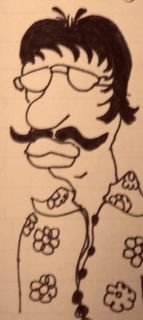Currently, in my American Fiction class we're reading Harriet Jacobs famous slave "narrative." The book is presented as a straight-forward autobiography. So why am I reading it in a literature class? My professor focused a large part of her lecture today on this topic. I'll spare you the 30+ minutes and cut to the chase--essentially, she said that ALL Autobiographies are works of literature. They use the same literary devices as fiction, and can therefore be regarded and judged the same as a work of fiction.
Jacob's book isn't a diary, it's a literary account of her life (highly fictionalized, despite her assertions in the introduction). Emphasis on certain events (and even the order they took place) is subject to her artistic interpretation. I get that, I guess. My teacher brought up Franklin's Autobiography (which I'd read in another American Fiction class) as another example of a person writing a skewed/fictionalized account of their lives. While this is a good example, it got me thinking about Stephen "Million Little Pieces" Fry.
Remember him? Yes, the Oprah dude. I used to hate that guy with a LOT of passion. And why not? He made a boatload of money on lies. But really, all Fry did is the same thing Jacobs did. He told an literary, slightly fictionalized version of his life story in order to make a point on a serious issue (drugs/drug addiction, rather than Jacobs slavery). Some people contend that Fry's book is still merits and should just be put in the "fiction" section in bookstores. But I disagree, here's why.
After my teacher gave her little "mini-lecture" on this topic (concerning Jacobs slave narrative) I raised my hand. I asked, "Basically, what you're saying is...any autobiography could be taught in this class." She agreed, and again brought up Franklin. Even if a person tells us "this is the truth, the whole truth, and nothing but the truth" like Jacobs, her book is filled with historically untrue things. Should then, this book not be studied and read? I think it has value. Should this book sit along side the Autobiography of Franklin? Yes, it should. And so should Fry's book. Essentially, these books are "true" in that, the people they are about lived, and this is an interpretation (one of many, no doubt) of their lives. Now, if these books were biographies, rather than autobiographies, then I guess I'd take some exception. But when the author is writing about himself, the rules are different.
Now, does this mean I should write my autobiography about how I married the Queen of England? No, I don't think that would have any real merit. But if I wrote my autobiography, even with the intent of only telling "the truth" some things would probably not "make the cut." Either for length or just because they aren't interesting. So already, I've begun editing my life. Changing it a bit (or at least SOME of the perspective around it). That doesn't take into account all the things I'd probably WANT to leave out (like what an ass I was last week, and the week before...). Even if I only leave out the incidents where I'm an ass that aren't necessary to understand the whole of my life...I'm still editing.
I guess, what I'm saying is, taking Fry out of the equation...my concept of Autobiographies is no longer what it once was. They really are nothing but books like Fry has written, a version of a person's history. But just that, a version. And since it ain't non-fiction...guess what?
Subscribe to:
Post Comments (Atom)






No comments:
Post a Comment